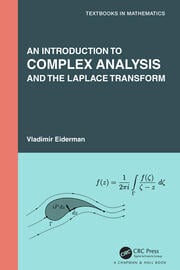1st Edition
An Introduction to Complex Analysis and the Laplace Transform
The aim of this comparatively short textbook is a sufficiently full exposition of the fundamentals of the theory of functions of a complex variable to prepare the student for various applications. Several important applications in physics and engineering are considered in the book.
This thorough presentation includes all theorems (with a few exceptions) presented with proofs. No previous exposure to complex numbers is assumed. The textbook can be used in one-semester or two-semester courses.
In one respect this book is larger than usual, namely in the number of detailed solutions of typical problems. This, together with various problems, makes the book useful both for self- study and for the instructor as well.
A specific point of the book is the inclusion of the Laplace transform. These two topics are closely related. Concepts in complex analysis are needed to formulate and prove basic theorems in Laplace transforms, such as the inverse Laplace transform formula. Methods of complex analysis provide solutions for problems involving Laplace transforms.
Complex numbers lend clarity and completion to some areas of classical analysis. These numbers found important applications not only in the mathematical theory, but in the mathematical descriptions of processes in physics and engineering.
Preface
Introduction
1. Complex Numbers and Their Arithmetic
Operations with Complex Numbers
2. Functions of a Complex Variable
Complex Plane
Sequences of Complex Numbers and Their Limits
Functions of Complex Variable. Limit and Continuity
3. Differentiation of Functions of a Complex Variable
Derivative and Differential
The Cauchy-Riemann Equations
Analytic Functions
Relations between Analytic and Harmonic Functions
Geometric Interpretation of a Derivative of a Function of Complex Variable
Notion of a Conformal Mapping
4. Conformal Mappings
Linear and Linear Fractional Functions
Power Function
Notion of a Riemann Surface
Exponential and Logarithmic Functions
General Power Function and Trigonometric Functions
Zukowski Function
General Properties of Conformal Mappings
An Application of Functions of Complex Variable in Hydrodynamics
5. Integration of Functions of a Complex Variable
Integral of a Function of Complex Variable
Cauchy Theorem
Indefinite Integral
Fundamental Theorem of Calculus
Cauchy’s Integral Formula and Their Applications
6. Series
Number Series
Functional Series
Uniform Convergence
Power series
Expansion of Functions in Power Series
Taylor Series
Uniqueness Property
Analytic Continuation
Complete Analytic Function
Loran Series
7. Isolated Singularities and Residues
Classification of Isolated Singular Points
Residue of a Function in an Isolated Singular Point
Evaluation of Integrals by Means of Residues
Logarithmic Residue and Argument Principle
8. The Laplace Transform
Laplace Transform
Basic Properties of the Laplace Transform
Application of the Laplace Transform to Solving Ordinary Differential Equations
9. Practicum
Solving of Typical Problems
Tasks for Self-Study Literature
Index
Biography
Vladimir Eiderman holds a Ph.D. from Mathematical Institute of Academy of Sciences, Armenian SSR. He is Rothrock Lecturer of Indiana University. He has been Professor, Moscow State University of Civil Engineering, Visiting Professor of University of Kentucky, University of Wisconsin-Madison, and Indiana University. Dr. Eiderman has more than 30 research publications.




